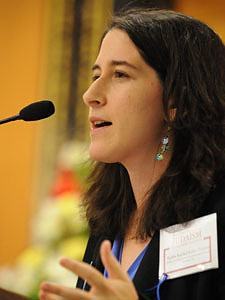As the Israelites wind down their adventures in the desert and prepare to enter the Promised Land as a free generation, they must again confront their faith in God’s ability to protect and provide for them. At the heart of Parashat Chukkat is the puzzling episode of Moses and the rock that yields water.[1] Through Moses and the costly mistake that he makes,[2] this parashah teaches us the proper way to express trust in God. The challenges that Moses and the Israelites face in finding the right way to engage in and express their belief in God challenge us to think about the ways we demonstrate commitment to our values in the public sphere.
In this episode, the people complain of thirst and of feeling abandoned by God. Moses is commanded by God to assemble the people and to order a specific rock to yield water. This is constructed as a highly visible spectacle: God specifies that the miracle must take place l’ayneihem, before the very eyes of the people.[3] Instead of immediately obeying God’s commandment and speaking confidently to the rock—showcasing the miraculous benevolence of the Divine—Moses[4] chastises the people and asks, “Will we get water for you from this rock?!”[5] This question shifts the focus away from God to God’s human agents, and does so in an exceedingly public forum. Moses proceeds to hit the rock, making it appear that he is the cause of the water that gushes forth.[6] The desired immediate result—salvation from thirst—is achieved, but the theological goal—demonstrating God’s power to the people—is not. God’s rebuke to Moses, that he “did not trust Me enough to affirm my sanctity in the sight of the Israelite people,”[7] emphasizes that through his public outburst Moses squanders an opportunity to reinforce the faith of the people and inspire them to trust in God.
A midrash[8] notes that Moses had doubted and challenged God prior to this episode, but until now had done so only in private and therefore without censure. The confrontation at the rock, however, is impossible for God to overlook. Moses is punished not for lacking personal faith, but for not inspiring faith in the Israelites. Here, Moses allows the Israelites to see the cracks and fissures in his own faith in God. This weakness is reflected in the Israelites’ future poor behavior and outbursts against God. Indeed, later in the parashah, the people complain again about the difficulty of life in the desert.[9] They have not learned to trust in God.
This passage suggests that our public actions, ones in which we commit our names and our reputations, can have significant impact, and that they need to be constructive in order to be effective. As social justice activists we need the courage to declare the importance of bringing justice to the world. Learning from Moses, we should make sure that our declarations are positive, have substance and invite participation. We must project and inspire confidence. We must speak to the rock.
Yet, much of what passes for “action” or activism today is superficial, even though in this age of Google it sometimes seems like nothing is private and that everything we do—from the petitions we sign to the donations we make—is part of the public record forever. We go onto Facebook and become fans of many different causes with a few mouse clicks. We wear a T-shirt with a cute slogan or slap on a bumper sticker. These forms of discourse are public but they are shallow. A public display with little to back it up is not that different from Moses’s outburst in the desert. It may deliver water, but does not inspire larger, more lasting results or change the consciousness of our audience.
To truly make a difference, we have to be willing to engage our values in public in a way that has meaning. We can call or write to our elected officials. We can attend a rally or a speech, and text our friends to join us there. We can write a letter to the editor or an op-ed. When we make donations to causes we believe in, we can allow those organizations to use our names in their lists of supporters. Or we can take a real risk with our Facebook friends and online followers, and actively engage them in an in-person conversation about the causes we believe in. Real engagement requires more than a mouse click.
We need to take up the challenge given to Moses by God to sanctify God’s name publicly and in a substantive way. There is real risk involved in taking a confident stand in the sight of others, but there are also real rewards.
[1] Bamidbar 20:6-11.
[2] c.f. Bamidbar 20:12. The explicit consequence of Moses’s mistake is that he loses his right to enter into the Promised Land.
[3] Bamidbar 20:8.
[4] It is unclear from the verse whether Moses himself or both Moses and Aaron make this statement of challenge.
[5] Bamidbar 20:10.
[6] Rashi, among others, favors the explanation that Moses’s sin was striking the rock rather than speaking to it.
[7] Bamidbar 20:12.
[8] Bamidbar Rabbah 19:10.
[9] Bamidbar 21:5.

